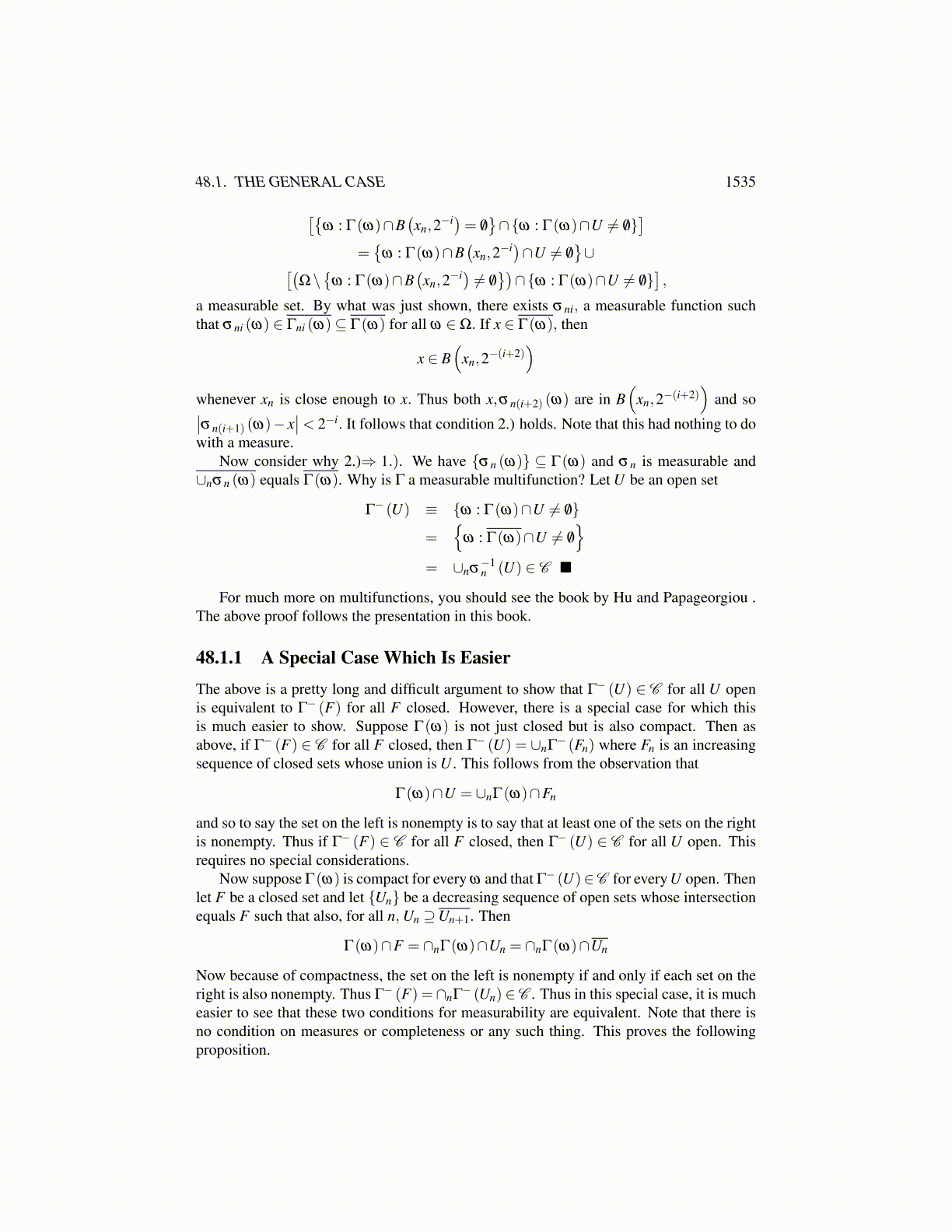
48.1. THE GENERAL CASE 1535
Now we verify that 4.) ⇒ 5.). Let F (ω) ≡ dist(x,Γ(ω)) . Then letting U be an openset in [0,∞), F (ω) ∈ U if and only if d (x,σn (ω)) ∈ U for some σn (ω). Let hn (ω) ≡d (x,σn (ω)) . Then hn is measurable and F−1 (U) =∪∞
n=1h−1n (U)∈C . This shows that for
all x ∈ X , ω → dist(x,Γ(ω)) is measurable and this proves 5.).Now we verify that 5.) ⇒ 4.). We know dist(x,Γ(·)) is measurable and we show
{ω : Γ(ω)∩U ̸= /0} ∈C whenever U is open and then use 3.)⇒ 4.). Since X is separable,there exists B(xi,ri) such that U = ∪∞
i=1B(xi,ri) . Then
{ω : Γ(ω)∩U ̸= /0} = ∪∞i=1 {ω : Γ(ω)∩B(xi,ri) ̸= /0}
= ∪∞i=1 {ω : dist(xi,Γ(ω))< ri} ∈ C .
Therefore, 5.)⇒ 4.) as claimed.Now we must prove 5.)⇒ 6.). We note that ω → dist(x,Γ(ω)) is measurable and
x→ dist(x,Γ(ω)) is continuous. Also, the graph of Γ,G (Γ) is given by
G (Γ) = {(ω,x) : dist(x,Γ(ω)) = 0} .
We wish to show that (ω,x)→ dist(x,Γ(ω)) is product measurable because then G (Γ) ,being the inverse image of {0} will be product measurable. Let {xk} be a countable denseset in X and let
φ k (ω,x)≡ dist(xn,Γ(ω))
where n is the first index such that x ∈ B(xn,2−k
). Then φ k (ω,x)→ dist(x,Γ(ω)) due to
the continuity of x→ dist(x,Γ(ω)) and so we must argue that φ k is product measurable.On
En ≡Ω×(
B(
xn,2−k)\∪m<nB
(xm,2−k
)),
φ k (ω,x) = dist(xn,Γ(ω)) . Thus, on this set, φ k equals a measurable function of ω anddoes not depend on x on En. It follows that there are measurable simple C measurablefunctions, sm (ω) which increase pointwise to dist(xn,Γ(ω)) on En. Thus sm (ω)XEn (x)increases to φ k (ω,x) on En showing that φ kXEn is product measurable with respect toC ×σ (τ) since En is a measurable rectangle with respect to C and σ (τ) . Therefore, φ k isproduct measurable and so (ω,x)→ dist(x,Γ(ω)) is also product measurable.
It remains to prove 6.)⇒ 1.). This follows from Theorem 47.0.19.
Γ− (B)≡ {ω : Γ(ω)∩B ̸= /0}
= projΩ (G (Γ)∩ (Ω∩B)) .
But from Theorem 47.0.19, projΩ (G (Γ)∩ (Ω∩B)) ∈ Ĉ ⊆ Cµ = C .The last part results from (Ω,C ,µ) being a complete measure space. Note that without
this assumption we could not draw the conclusion desired. This required consideration ofthe measure. The following theorem is like part of the above but without an assumptionthat Γ(ω) is closed.
Theorem 48.1.3 The following are equivalent for any measurable space consisting onlyof a set Ω and a σ algebra C . Here nothing is known about Γ(ω) other than that is anonempty set.